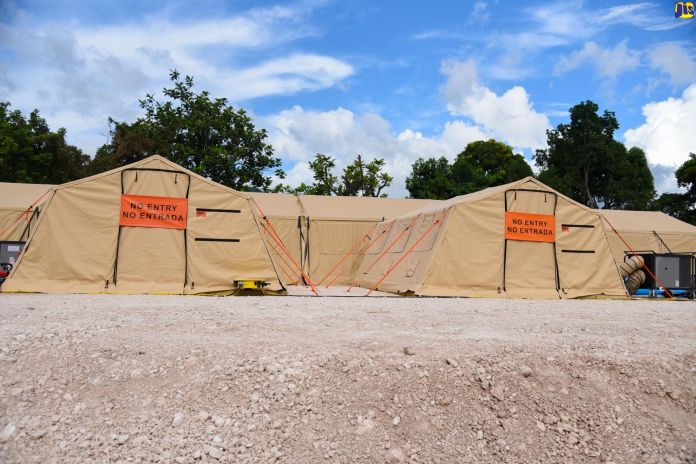By Ainsworth Morris
KINGSTON, Jamaica (JIS) – Jamaica’s capacity to monitor and treat patients with the coronavirus (COVID-19) has been boosted through the donation of a field hospital, valued at approximately $105 million, by the United States government.
The 70-bed facility, located on the grounds of the National Chest Hospital in St Andrew, was officially handed over on Thursday, September 24 by US ambassador to Jamaica, Donald Tapia and Commander, US Southern Command, Admiral Craig Faller.
It is equipped with handheld thermometers and patient beds.
Minister of health and wellness, Dr Christopher Tufton; and minister of foreign affairs and foreign trade, Senator Kamina Johnson Smith, accepted the donation on behalf of the government and people of Jamaica.
Dr Tufton in expressing gratitude said that the field hospital “could not have come at a better time”.
“Those who track what is happening as it relates to the COVID journey that we are travelling on would recognise that just a few weeks ago, we declared community transmission, which is a phase of the virus that means more persons will have the virus. The response that is required, as a result of this, means more infrastructure, and so the facility here has come at the right time,” he noted.
Tapia, for his part, said he is confident the hospital will be put to good use. “This symbolises another milestone in the long-standing partnership between the two countries. Whether its security, business or public health, the United States of America and Jamaica have established a strong tradition of cooperation,” he noted.
Tapia said that when the current crisis has passed, the hospital will remain as a vital tool in the response to any future public health emergency or national disaster, whether in Jamaica or throughout the Caribbean.
This donation forms part of US Southern Command’s ongoing assistance to nations in the Caribbean, Central America and South America, and is funded by the Command’s Humanitarian Assistance Program (HAP). The US Southern Command has also funded the donation of handheld thermometers and patient beds at a cost of approximately $12 million.
This modular hospital is equipped to operate autonomously and includes a high-efficiency particulate air (HEPA) and ultraviolet-light air-scrubber system, two diesel generators and eight air-conditioning units.
Medical teams using the hospital will have the flexibility to configure it to isolate patients and conduct surgical operations if needed.





